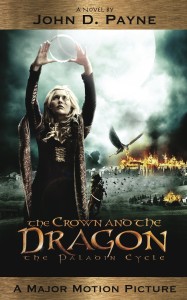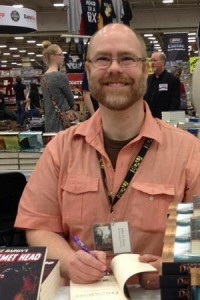A guest post by John D. Payne
 I chose to write about consistency because it’s something that I myself need to work on. So I’m going to keep this in first person and talk about some of the ways I want to be more consistent.
I chose to write about consistency because it’s something that I myself need to work on. So I’m going to keep this in first person and talk about some of the ways I want to be more consistent.
1. Consistent writing
A professional writing at a decent clip produces about a thousand words in an hour. At that pace, you’ll have the first draft of a nice fat novel in one year even if you only write 15 minutes a day, as a number of successful pros have observed. That’s a lot of result for not much effort.
So, two summers ago I made a goal to write every day, even if only for a few minutes. I have months where I pretty much pull this off, and months where I’m not terribly close. But even with this spotty record, the last two years have been my best in terms of output.
Output matters. Lots of writers have been quoted as saying that the first million words anyone writes are just practice. This really is just a variant of the ten thousand hour rule, that it takes lots of time to become successful at anything.
And not only will churning out lots of stories help me develop my skills as a writer, but it will help me feel more confident and comfortable with my voice. Rather than expecting that everything I write has to be perfectly polished before I can move on, I can be a little more forgiving of myself and have fun as I go. It’s like playing with legos. I pour out a bunch of ideas, grab my favorites, and then assemble them in whatever way strikes my fancy. I’m just having a good time making a bunch of cool stuff.
I’ve tried inspiring myself to produce more in different ways. The desire to finish my first novel was a powerful motivation. Weekly submissions to my writing group make good mini-deadlines. And of course deadlines written in contracts and attached to paychecks are the best of all.
It also feels good just to keep a streak alive. That’s the secret to Tony Pisculli’s online writing tracker, The Magic Cricket. There are lots of others out there. The thing that has worked best for me so far is a calendar with stickers. It feels good to see all those gold stars.
This July, I’m going to use Camp Nanowrimo as another way to push myself to greater heights of accomplishment. Given my lack of consistency over the last few months, I fear that this will be like running a marathon without proper preparation. But even if I don’t make it to 50,000 words by the end of the month, every word I write will prepare me for what comes next. And if there’s anything I’ve learned from Dean Wesley Smith, it’s that every month is Nanowrimo if writing is your career.
2. Consistent finishing
When I was younger, I got bogged down trying to perfect and polish stories that weren’t even finished. Since then I’ve realized that finishing something is a better use of my time than trying to get the beginning of something perfect.
Everything I write is in some ways an experiment, and not all of it will be equally appealing to me, or to readers. That’s hard to accept, because of course I want everything I produce to be of the very finest quality. But as Clausewitz said, quantity has a quality all its own.
For one thing, every story I finish (and get out there where people can read it) helps me build an audience. I love both Pat Rothfuss as much as I love John Scalzi and Brandon Sanderson. But I have a lot more of John and Brandon’s work on my shelves (both digital and physical) because both of them consistently put out new books for me to buy.
In addition to daily wordcount goals, I also have goals to finish stories. At the Superstars Writing Seminar, Kevin J. Anderson (a very consistent producer) said that there’s no reason any new writer of genre fiction shouldn’t submit a new story to the Writers of the Future contest every quarter. I’m very glad to say that I’ve followed that advice, and I recommend that everyone who’s eligible do the same.
This year, I have two goals relating to finishing. I want to start and finish a new novel between this summer and next. And I want to finish a new story every month, even if it’s only flash fiction. After all, every story I finish is a story I can sell– which is good, because I also plan to continue submitting a story to a paying market every single week. I’ve done that for the last two years, and although I’ve only made one sale so far it has also taught me a ton about this business.
3. Consistent self-education
No matter how well-informed I am at this minute, no matter how perfect my business strategy is for today’s market, continuing to educate myself is just plain necessary. Of course, as with any other non-writing activity (social media, etc.), I need to always ask myself: Would I Be Better Off Writing? But without self-education, my career will not move forward.
I need to learn about every part of the industry– and the industry is constantly changing. Covers and interior design, blurbs and back cover copy, contracts, marketing, printing, etc. Fortunately, there are lots of people who are sharing their knowledge and teaching me how to do things myself: Kristine Kathryn Rusch, Joe Konrath, The Passive Voice, Hugh Howey, etc.
Even if I become the pampered darling of a big New York firm, or in some other way outsource everything but the actual writing, I need to know enough to protect myself. I hate taking my car to the shop and not knowing whether I really need to spend $700 to get that O2 sensor fixed. Educating myself means I don’t just have to hope that everyone else is being nice to me. Trust, but verify, as Reagan and Gorbachev agreed.
4. Consistent niceness
As with most any career, it’s a good idea for me to be nice. This means more than just handing my business card to big names in the industry (although I do that). First and foremost, I have an obligation to fans to be approachable and friendly. After all, it’s their good will, and of course their money, that ultimately fuels my career. And it’s important to be consistent about this, because even one bad moment might turn into a story that floats around the community for years to come.
Speaking of having a good reputation, I want to be someone that others want to work with. That means three things: doing good work, delivering on time, and not being a horrible, horrible jerk. Neil Gaiman rightly notes that you can get by on just two out of three. But if you want to maximize the chances that people will send work your way, shoot for all of the above.
So be a mensch. Mensches make the world go round, as my dissertation advisor told me many times. One way I practice meeting my professional obligations is by participating in a writing group. Every week, other people read my submissions and give me valuable feedback. The least I can do is return the favor.
There’s lots more to say, but (as usual), I’m over my word count. So I’ll just close by saying that writing this blog has helped me realize two things. First, there are lots of ways that consistency can help me as a writer. Second, I’m not bad at all of these.
So, as you’re revisiting your goals and thinking about what you’re going to do with the second half of this year, don’t be too hard on yourself. Give yourself credit for the things you’re doing well. After all, feeling good about how you’re doing makes it easier to maintain a consistent effort.
Good luck!
 Did we make it? Did we survive the June heat and the mid-year failures or successes? I learned a lot and got reminded of more. So for me, this was a good month… on the Fictorians and in achieving my personal goals. If you missed anything, here’s a quick summary with links.
Did we make it? Did we survive the June heat and the mid-year failures or successes? I learned a lot and got reminded of more. So for me, this was a good month… on the Fictorians and in achieving my personal goals. If you missed anything, here’s a quick summary with links.

